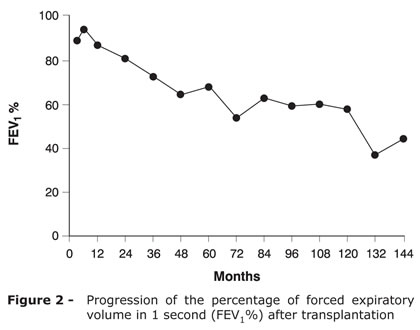OBJECTIVE: To report the long-term follow-up of the first living-donor lobar lung transplantation performed in Latin America. DESCRIPTION: The patient was a 12-year-old boy with post-infectious obliterative bronchiolitis with end-stage pulmonary disease. He was on continuous oxygen support, presenting with dyspnea even during minimal activity. He underwent bilateral lobar lung transplantation with living donors. The procedure was performed with the left and right lower lobes of two different related donors. In the second side cardiopulmonary bypass was required. The transplant was uneventful, and the patient was extubated after 14 hours and discharged with 44 days, after resolution of infectious, immunological and drug-related complications. After 12 years of follow-up, he presents with adequate lung function and has resumed his habitual activities. COMMENTS: Living-donor lobar lung transplantation is a complex procedure feasible for the treatment of selected pediatric end-stage pulmonary disease. This particular population might benefit from this approach since the availability of pediatric donors is very scarce and the clinical course of pediatric advanced pulmonary disease may be unpredictable.
Lung transplantation; bronchiolitis obliterans; living donors; pediatrics



